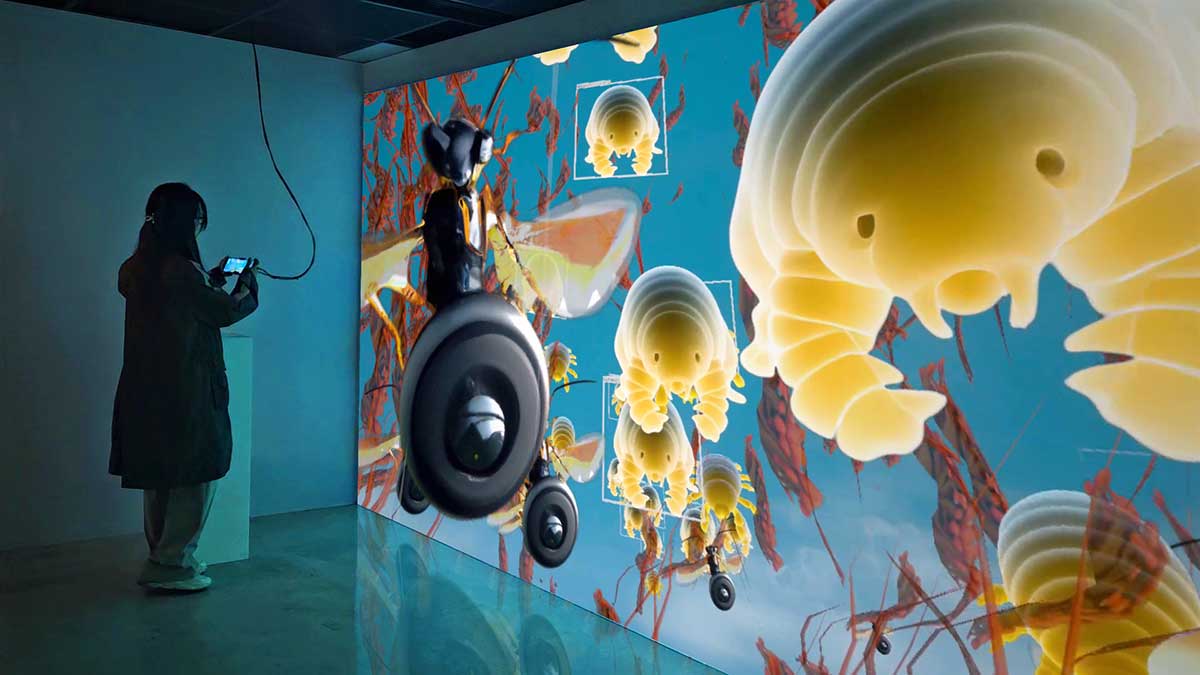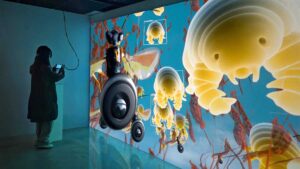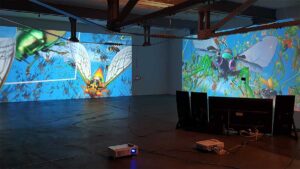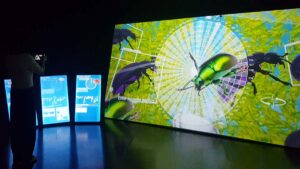FILE SAO PAULO 2024
Electronic Language international Festival SESI Gallery, São Paulo, BrazilCurator: Ricardo Barreto and Paula Perissinotto
Artists: Anabela Costa, Anna Vasof, Arnaud Weber, Banz & Bowinkel, Breno Marques, Bruna Mayer, Cali Wang, Camila Magrane, Clive Huson (Stackpooled AI Films), Daniela Gatti, Davis Chang, Dennis Schöneberg, Dr. Sam Khoze, Eduardo Reck Miranda, Felipe Mamone, Flavia Mazzanti, Fredrik Jonsson, Gabi Szita (aka Sieve), Gabriela Barreto Lemos, Grupo Realidades ECA/USP, Guilherme de Souza Vieira, Guli Silberstein, Gustavo Sol, Gustavo Wiederhecker, Hassan Ragab, Ines Alpha, Infratonal, Introscopia, Iskarioto Dystopian AI Films, Istituto Europeo di Design – IED São Paulo, Jane de Almeida, Jesse Koivukoski, Kelly Luck, Klaus Obermaier, Leilanni Todd, Leonhard Peschta, Luca Ribeiro, Luciano Cruz, Luigi Novellino (aka PintoCreation), Lukas Radavicius, Marc Lee, Marc Vilanova, Marcelo Padovani Macieira, Martina Menegon, Mathieu Samson (Solofilms), Matthias Oostrik, Max Haarich, Maxime Dallaserra, Michael Sadowski (aka derealizer), Miguel Alonso, Nardex, Paul Gründorfer, Paulo Nussenzveig, Robert Seidel, Roberto Serra, Roxanne Ducharme, Roxy Jin, Sam Rolfes, SENAI São Paulo, Seph Li, Shervin Saremi, Silvia Laurentiz, Stefano D’Alessio, Studio McMullen_Winkler, SurrealismToday.com, Talita Florêncio, The Reel Robot, Thiago Salas, Thoroh, UGLYKIKI, Valentin Rye, Valentina Ferrandes, Verbo Pluriel (aka volt46), Vinicius de Martin Viude, VRinMotion Team, XWave, YAH!

FILE, São Paulo
QUBIT AI
In its 25 years of existence, the International Electronic Language Festival (FILE) is an internationally renowned Brazilian project that since 2000 has explored the intersection between art and technology. With more than two decades of history, the festival stands out for fostering exhibition spaces and debate about artistic innovations driven by disruptive and innovative technologies, inviting the public to get involved with experimental forms of art that challenge the boundaries of conventionality. Currently, two of these technologies stand out in the contemporary scenario: the accelerated development of quantum computing and artificial intelligence corroborated by synthetic data.
Quantum computing, an emerging revolution in the technological field, offers a new range of creative possibilities for contemporary artists. This new era allows the exploration of unprecedented frontiers through a new computational format that consists mainly of quantum superposition and entanglement, a new field of exploration for computer science, as well as for the arts in general; on the other hand, artificial intelligence, fueled by synthetic data, offers artists a new way of making and understanding art, opening up space for new forms, concepts and artistic expressions.
Entitled QUBIT AI, the exhibition delves into this unexplored territory presenting a selection of works of art resulting from the connection between artistic creation and technology, proposing a theoretical reflection on what the interrelationship between quantum computers and synthetic artificial intelligence will be.
Visitors will be invited to experience immersive installations, experimental videos, digital sculptures and other forms of interactive art, which intertwine reality and imagination. The exhibition encourages reflections on the influence of technology on art and contemporary society, while providing an environment to compare already established technological arts (analog and digital) with the possible futures of art in the synthetic era, enhanced by quantum computing . The QUBIT AI exhibition at FILE SP 2024 transcends the mere presentation of works of art; it is a journey to the limits of human creativity, driven by the convergence of art, science and technology.
Exhibited Artwork
Speculative Evolution
Mobile App as Interface for Net-Based InstallationsDue to the threatening predictions of species extinction and global warming, scientists and farmers are increasingly relying on technologies such as genetic engineering, synthetic biology and machine learning. Speculative Evolution imagines a speculative ecosystem 30 years from now, where artificial intelligence and biotechnologies work together to create and optimize species to withstand the increasingly more …

FILE, São Paulo

Kunsthalle, Schaffhausen

Biennale Nemo, Paris